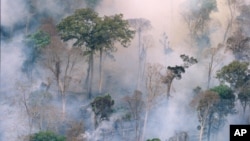WASHINGTON DC - New European legislation passed last month could help transparency in the extractive industries, by forcing companies to declare payments to foreign governments rich in resources.
The EU legislation, approved Sept. 18, is similar to a new US law calling for the same thing. The European legislation does not just cover oil and mineral wealth, but is extended to forestry resources as well. And It covers private and public companies.
Lim Solinn, deputy director of Oxfam America’s East Asia office, said the law requires companies to disclose spending at the “project level.”
For resource-rich countries like Cambodia, that means much more transparency, she said. More than 95 percent of the world’s major extractive firms have shares in the EU or US stock exchanges, subjecting them to the transparency laws.
“Cambodians have faced difficulty in accessing information about payments made by such major extractive firms to the government,” she said. “Therefore, when this law comes into effect in 2014, the major firms have to publish their payments and people will know where the money goes and how it is managed so that it goes to effective investment to help with social development and poverty alleviation.”
Cambodia now has a “great opportunity” to follow the legislative examples of the West to draft its own transparency laws, she said. Oxfam America, an international donor to Cambodia, is asking Cambodia for more transparency and accountability in its extractive industries, she said.
“We hope that Cambodia will join the international transparency movement,” she said. “The first step is, Cambodia can show its willingness is to join [the Extractive Industries Transparency Initiative]. Cambodia can be a member to show its commitment to guaranteeing transparency in the extractive industries.”
The EU legislation, approved Sept. 18, is similar to a new US law calling for the same thing. The European legislation does not just cover oil and mineral wealth, but is extended to forestry resources as well. And It covers private and public companies.
Lim Solinn, deputy director of Oxfam America’s East Asia office, said the law requires companies to disclose spending at the “project level.”
For resource-rich countries like Cambodia, that means much more transparency, she said. More than 95 percent of the world’s major extractive firms have shares in the EU or US stock exchanges, subjecting them to the transparency laws.
“Cambodians have faced difficulty in accessing information about payments made by such major extractive firms to the government,” she said. “Therefore, when this law comes into effect in 2014, the major firms have to publish their payments and people will know where the money goes and how it is managed so that it goes to effective investment to help with social development and poverty alleviation.”
Cambodia now has a “great opportunity” to follow the legislative examples of the West to draft its own transparency laws, she said. Oxfam America, an international donor to Cambodia, is asking Cambodia for more transparency and accountability in its extractive industries, she said.
“We hope that Cambodia will join the international transparency movement,” she said. “The first step is, Cambodia can show its willingness is to join [the Extractive Industries Transparency Initiative]. Cambodia can be a member to show its commitment to guaranteeing transparency in the extractive industries.”







